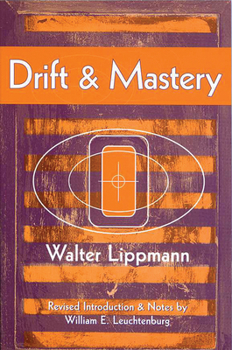Drift and Mastery
Select Format
Select Condition 
Book Overview
Drift and Mastery, originally published in 1914, is one of the most important and influential documents of the Progressive Movement, a valuable text for understanding the political thought of early twentieth-century America. This paperback edition of Walter Lippmann's classic work includes a revised introduction by William E. Leuchtenburg that places the book in its historical and political contexts.
In his first book, A Preface to Politics, Lippmann was sharply critical of traditionalism in favor of creativity--so much so that he was accused of anti-intellectualism. In Drift and Mastery, he corrected this imbalance, exploring the tensions between expansion and consolidation, traditionalism an progressivism, emotion and rationality. He wrote to convince readers that they could balance these tensions: they could be organized, efficient, and functional without sacrificing impulse, choice, fantasy, or liberty. Mastery is attainable, Lippmann argued, but scientific endeavor is driven by human curiosity and creativity--an argument in favor of science as both a method as both a method for discovering the truth and a means of wish fulfillment through diligent attention to facts.
Drift and Mastery is both a telling product of its times and a lucid exploration of timeless themes in American government and politics. It will continue to serve new generations of scholars and students in American intellectual history, mass communications, and political science.





